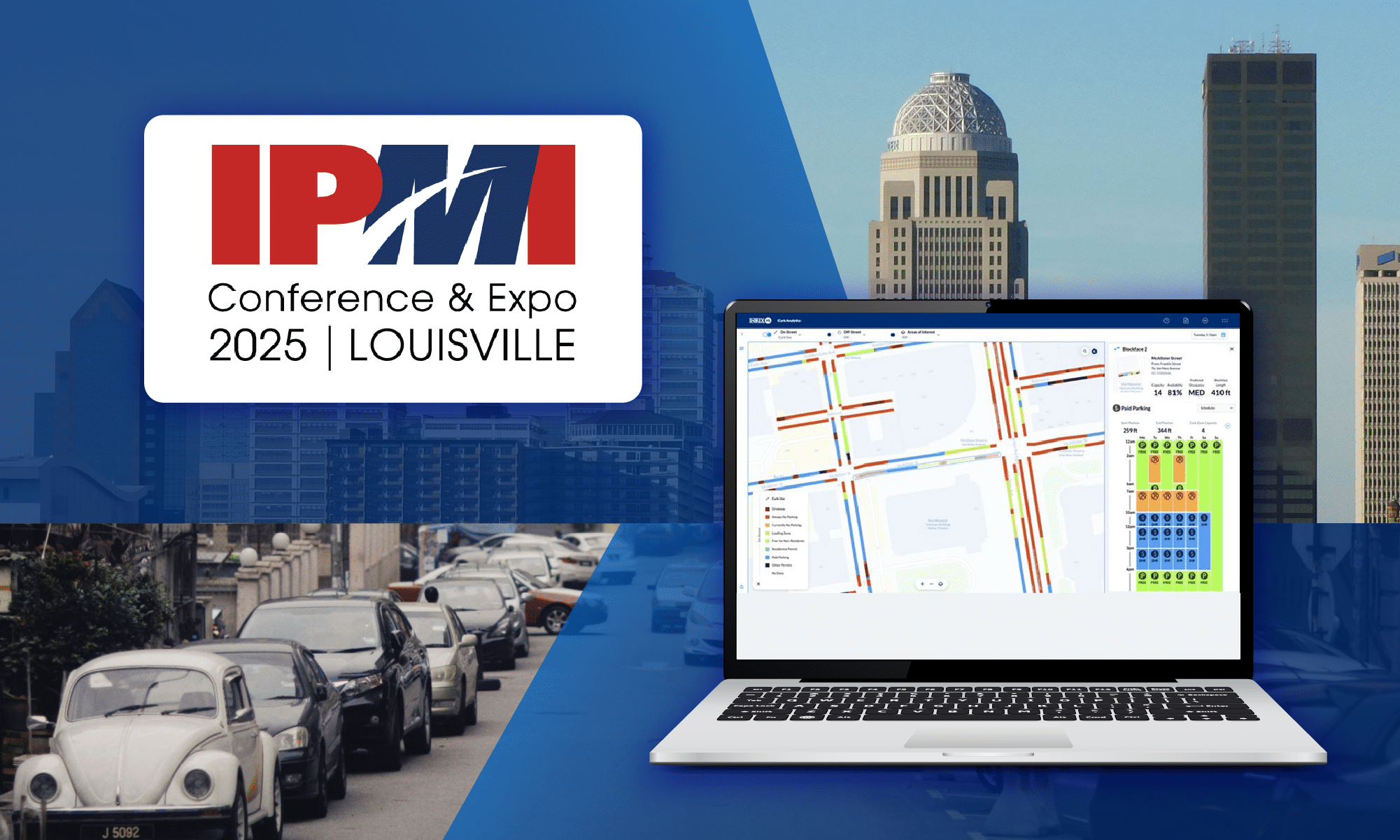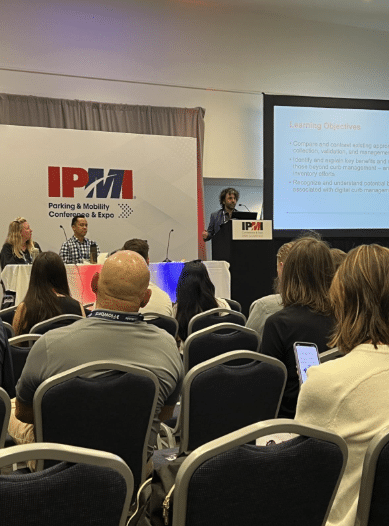
In June, three members from INRIX — Michael Schwartz, Kory Young, and Nathan Berry — joined transportation leaders from around the country in Louisville, KY, at the International Parking & Mobility Institute (IPMI) Conference & Expo to showcase how data, software, and public-private partnerships are shaping the next generation of on–and–off street parking solutions to advance mobility goals.
From dynamic curb zones to predictive parking analytics, this year’s conference emphasized that curb management and off-street parking are now a digital priority, and INRIX is delivering the tools cities need to stay ahead.
The Shift from Hardware to Software in Curb Management
Session topics and vendor displays underscored that the parking and mobility industry is undergoing a major transformation. City agency staff and mobility providers are shifting their focus from traditional, hardware-heavy solutions toward software-first strategies that offer more affordability, flexibility, scalability, and real-time insights.
This trend was especially apparent in the rising interest around curb digitization — how cities can better understand, manage, and optimize the use of curb space for various purposes, from rideshare and last mile delivery to micromobility and traditional vehicle parking. There were three sessions featuring efforts by city agencies implementing federal Strengthening Mobility and Revolutionizing Transportation (SMART) grant projects that included curb digitization.
INRIX and Shaping the Digital Curb
INRIX was thrilled to show how our tools support this shift and engaged with key partners, including Passport and the Open Mobility Foundation (OMF), to explore how data and collaboration are vital to the future of curbside management. Our team demoed INRIX Curb Analytics to several city representatives, showing how cities like San Francisco, Alexandria, and Portland are using our platform to:
- Map citywide curb inventory – including both on- and off-street parking supply, pricing, and regulations.
- Leverage predictive modeling – with machine learning tools that forecast occupancy and demand to help inform compliance, demand responsive pricing, and policy decisions.
- Make data-driven decisions– by understanding curb activity block by block, city leaders can develop policies that help achieve city goals such as congestion reduction, economic development, and equity.
Whether you’re looking to improve access for delivery vehicles, reduce congestion, or plan for the future of urban mobility, INRIX’s Curb Analytics software offers cities a powerful, ready-to-use tool. At IPMI, we spotlighted several of its key benefits:
- Easily Implementable: Curb Analytics has already collected curb data in 125 cities across North America and Europe. The data is ready to be used on day 1, out of the box. No expensive or time-consuming data collection efforts required.
- Powerful Planning Insights: Identify trends and inefficiencies by comparing curb regulations to predicted occupancy or data from real-time sensors. Answer questions like: Where are delivery drivers most likely to double-park? Are we charging enough in a commercial district to achieve turnover and maximize the use of the curb?
- Support for Sustainable Mobility: Support TDM goals and reduce vehicle emissions by managing curb access for transit, shared mobility, and zero-emission zones more effectively.
Mobilizing Cities Through Partnership

Michael Schwartz, General Manager for City Software Solutions at INRIX, spoke on a panel with Alex Demisch from the San Francisco Municipal Transportation Agency (SFMTA) and Rae-Leigh Stark from the Portland Bureau of Transportation to discuss lessons learned from the SMART grant projects, all of which included citywide curb digitization. There was significant engagement in a packed room on the strengths and challenges of different approaches to digitization, how to use demand based predictive occupancy to support dynamic parking pricing, and how to operationalize parking data to support day-to-day practices of parking managers by helping to guide compliance. A core strength of INRIX is its robust public-private data ecosystem, built on trusted partnerships with leaders across the mobility landscape. INRIX collects real-time data from a wide range of industry leaders, including:
- Automakers & OEMs (GM, Toyota, Ford)
- Mobility & logistics providers (Lyft, Lime, Uber)
- City platforms and infrastructure partners (Passport, Serve, APCOA)
This ecosystem enables INRIX to deliver high-impact value to communities:
- Data to cities to benchmark performance and support policy goals
- Data to devices for navigation, route optimization, and user mobility
- Software to cities to help communicate and operationalize policies
Nashville and Austin are already using INRIX tools to improve curb access, plan for multimodal growth, and deliver more responsive public services. From simplifying curb management to enabling long-term transportation planning, INRIX is helping cities take control of their mobility future — with scalable technology, powerful analytics, and a commitment to public-private collaboration.
We’re excited to continue the conversation. Whether you’re just beginning your curb digitization journey or ready to optimize across multiple modes, INRIX is here to help turn mobility data into meaningful action. Reach out to schedule a personalized demo of INRIX Curb Analytics.




